Experts say NSW must dig deep to help fix our power bill crisis
There is a plentiful energy source available in NSW that could help slash electricity bills for households across the state — but both major parties refuse to give it the green light. Wholesale gas prices could be slashes, benefiting hardworking people and businesses of the state.
There is a plentiful energy source available in NSW that could help slash electricity bills for households across the state — but both major parties refuse to give it the green light.
Experts say if coal seam gas (CSG) mining is harnessed to unlock the untapped potential of NSW, wholesale gas prices could be slashed from about $10 per gigajoule to $5 — a price point which makes gas-fired power generation a more attractive prospect.
This in turn would bring down electricity prices, benefiting the hardworking people and businesses of the state.
Since 2011 no gas project has been approved, with both the Coalition and Labor Party caving into pressure from green activists who want to ban coal seam gas mining in NSW forever.
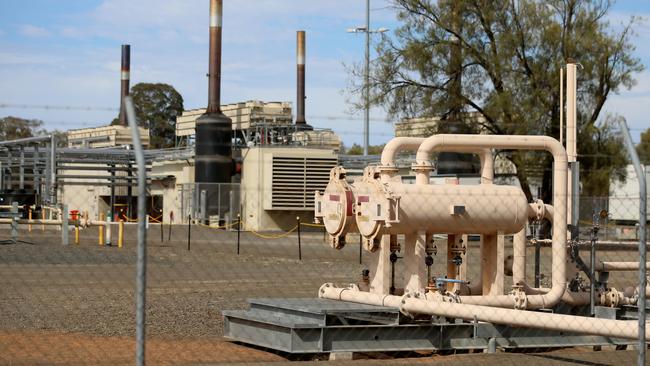
MORE NEWS
Gunman opens fire in tram ‘terror attack’
Criminal past of the man who tackled the eggboy
Sydney’s most powerful cats Part 2
The last project to be approved in NSW which entered production was AGL’s Camden Gas Project, which was approved in 2001 and is slated to close in 2023.
Australia has major CSG resources. It is natural gas found in coal seams, where underground water pressure keeps it contained.
It is extracted using a method known as fracking, which involves the high-pressure injection of fluid into a wellbore to create cracks in the deep-rock formations through which natural gas will flow more freely.
This method has sparked environmental concerns but new technology and safer mining methods have helped allay these fears in countries such as the US.
EXPENSIVE OUTLAY
Australian industry has been crying out for cheaper gas, with spot prices increasing fourfold since 2016, forcing some businesses to shut down and others to lay off workers.
We are all also being slugged with higher electricity bills, which according to the Australian Energy Regulator have increased from $1318 a year in 2011 to $1710 in 2018.
Over the same period the annual price for retail gas per household increased from $576 to $745.
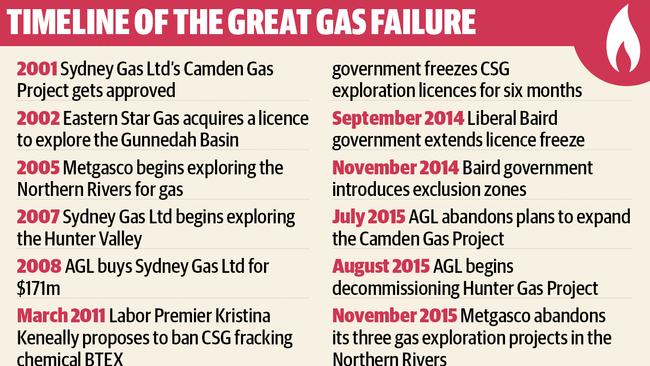
NSW imports about 96 per cent of its gas but independent advisory firm EnergyQuest says there is enough gas in the ground in the state to supply everyone.
EnergyQuest chief Dr Graeme Bethune said if large-scale gas development occurred across NSW then wholesale prices would be cut in half.
“Gas prices would be lower than they are now, the market wouldn’t be tight,” he said.
“If there was large scale development prices would probably be more like $5 a gigajoule rather than $10 gigajoule.”
SEVERE RESTRICTION
The Liberal/Nationals support CSG mining as long as it occurs outside hundreds of exclusion zones across the state, including residential areas in 152 local government areas, and gets the tick of approval from the Independent Planning Commission.
Labor wants a statewide moratorium on CSG, underpinned by a range of permanent “no-go” areas where CSG should never be permitted.
The restrictions effectively make the Santos Narrabri Gas Project in northern NSW the only remaining viable option for gas production in our state.
“Lower gas prices in NSW would help take the pressure off electricity prices.
However, this requires large-scale gas development in NSW,” Mr Bethune said.
CRISIS POINT
Credit Suisse analyst Saul Kavonic said NSW is facing a gas crisis, with cheap legacy gas sources running out, tightening supply and pushing up prices.
“The Narrabri project can help bring on more supply and would likely result in some lower cost gas made available to manufacturers to support manufacturing jobs,” he said.
“But further new gas supply developments would be needed … in order to structurally lower gas prices across NSW for all users.”

Ross Campbell is the owner of Campbells Hire in Narrabri, a farm equipment business that has experienced a 40 per cent drop in revenue this year due to the drought.
He supports the gas project because it would generate jobs: “Santos has been doing it for a very long time and the stringent rules they have to abide by are some of the toughest in the world.”
Santos chief Kevin Gallagher said NSW has very strong environmental regulation to ensure Narrabri can be developed safely and sustainably.
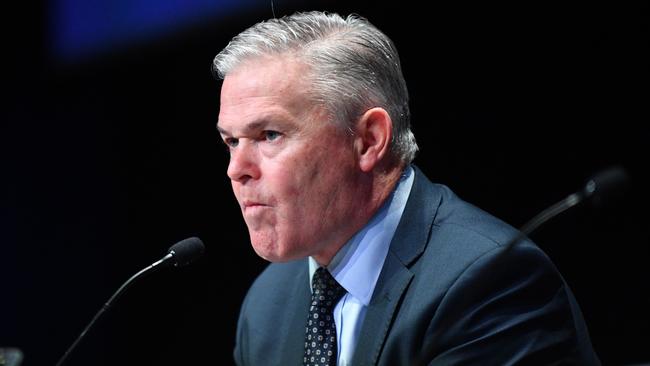
“If NSW doesn’t develop gas resources, then the people of NSW will pay more for gas and electricity, and manufacturing jobs will go elsewhere,” he said.
Shawn Wales owns The Grayhound homewares store on the main street in Narrabri and said she supported the gas project as long as the environment was protected.
“I’m open to all of that … I am one for looking after our environment, and you’ll find that farmers will be that way too,” she said.
COUNTING THE COST OF RISES
A huge rise in gas prices forced Seven Hills-based manufacturer RemaPak into voluntary administration in January.
The company employs about 50 people and is one of Australia’s biggest producers of polystyrene cups, plastic cups, plastic lids and plastic beer cups.
General manager Adam Hope said in 2015 RemaPak was paying about $4 per gigajoule of gas, but today it has hit $15 to $16 — a price point which has become unsustainable.
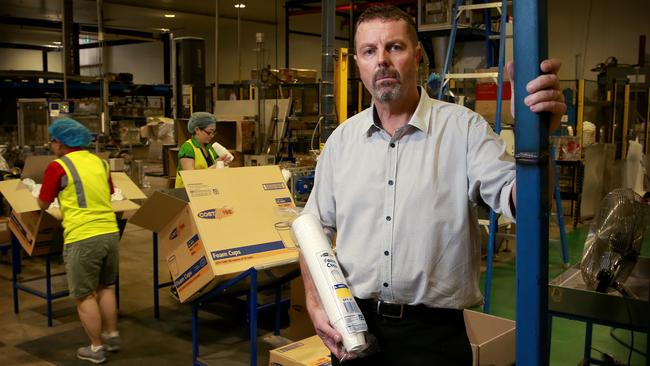
“The price of gas has quadrupled … we use up to 420 gigajoules a day, so our bill over time has been as high as $120,000 over two weeks,” he told The Daily Telegraph.
When prices were cheaper RemaPak would make about 1.5 million polystyrene cups per day, but this has now dropped by about 50 per cent.
Mr Hope said his Australian clients were now deciding to import plastic products made in China and Malaysia, which have cheaper production costs.
“The high energy prices have been pretty crippling. We have got a lot of good customers, but for them to absorb these increases it’s not reasonable, and they can’t pass it on to their customers because there is always someone willing to come in with a cheaper alternative,” he said.
The administrators of RemaPak are hosting a second meeting of creditors in May.
UNCERTAIN REGULATION DAMPENS CSG ALLURE
Coal seam gas mining in NSW was once an attractive investment prospect for oil and gas companies, however, unpredictable regulatory processes and anti-CSG activist groups have helped kill it off.
The public reputation of CSG took a huge hit in 2010 following the release of the US documentary Gasland, which included images of water pouring from a kitchen tap being lit on fire — putting fracking front of mind in communities across the world.
Newly elected Premier Barry O’Farrell placed a moratorium on CSG fracking within a month of the 2011 state election.
Mr O’Farrell’s successor, Mike Baird, then introduced a gas plan in 2014 which laid out the framework for the CSG industry in NSW.
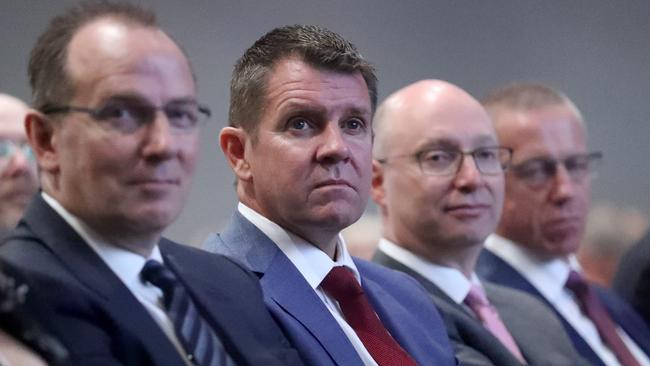
He introduced exclusion zones, making residential areas in 152 local government areas “off limits” to new CSG activity, and also banning CSG activity within 2km of future residential areas.
The Baird government also began buying CSG exploration licences back off miners, including paying Metgasco $25 million for its licences in the Northern Rivers.
The Santos Narrabri Gas Project is now the only proposal left in NSW that has the potential to produce gas.
It is being assessed by the NSW Department of Planning ahead of a decision by the Independent Planning Commission.
According to research firm EnergyQuest, NSW used 125 petajoules of gas in 2018, with a majority of the gas sourced from outside the state.
“Gas reserves and resources that gas companies identified in NSW peaked at 10,500 petajoules in mid-2011, prior to the start of restrictions in NSW,” EnergyQuest CEO Graeme Bethune said.
“Due to the restrictions Santos Narrabri (2254 petajoules) is all that is potentially accessible now and even that might not be, depending on government policy.”
NSW is now the seventh most unattractive place in the world for petroleum and gas investment, as voted by the Fraser Institute’s 2018 global survey.


